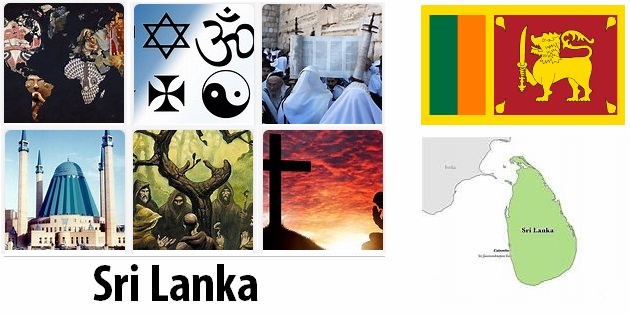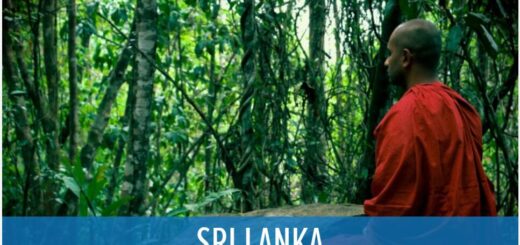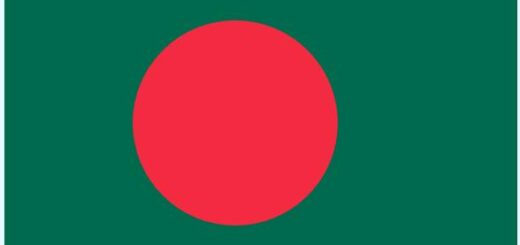Sri Lanka Religion
Sri Lanka’s constitution states that religious freedom should prevail, but also that the state should promote Buddhism. Almost all Sinhalese profess Theravada Buddhism, while the majority of the country’s Tamils are Hindus.
Theravada Buddhism, the “small craft”, also occurs in Myanmar (formerly Burma), Thailand, Laos and Cambodia. For the adherents, the Buddha’s philosophy is at the center and the Buddha is seen as a teacher of wisdom and an example but not as a savior figure, as is the case in Mahayana Buddhism, the “great vessel” found in, for example, Tibet, China, Japan, Korea and Vietnam.
There are three Buddhist monks who together control significant properties in the interior of Sri Lanka. These organizers, with their more than 50,000 monks, have a great influence on opinion formation in the country. Around 6,000 Buddhist temples are scattered across Sri Lanka and in the country are several of the most important Buddhist pilgrimage destinations (see Culture).
According to the 2012 census, just over 70 percent of Lankes are Buddhists, while nearly 13 percent are Hindus, nearly 10 percent Muslims, and just over 6 percent Catholics.
Islam came to Sri Lanka in the 7th and 8th centuries with Arab traders. Muslims are also believed to have immigrated from India over the centuries. The Muslims profess to Islam the main direction of Sunni.
Catholicism dominates within the Christian minority of the country. There are both Christian Sinhalese and Christian Tamils. They live mainly in the southwestern part of the country.
The religious tolerance has traditionally been great, but in recent years Buddhist extremists have increasingly attacked the country’s religious minorities. Since 2013, nationalist Sinhalese Buddhist organizations have been increasingly attacking Muslims. In the past, militant Buddhists have regularly attacked Christian targets, but attacks against Muslims have taken on completely different proportions and several people have been killed.
The extremists are led by the Buddhist Brigade (Bodu Sala Sena, BBS). The brigade aims to secure Buddhist dominance in the Lankan society and believes that the Muslim population is exerting too much influence in politics and business. BBBS demands, among other things, that the veil should be banned in public places and that the Muslim way of slaughtering animals should be banned.
Population
In Sri Lanka, the Buddhist Sinhalese make up the majority of the population with a share of almost two thirds. The predominantly Hindu Tamils are the second largest population group.
Thanks to the effect of state awareness campaigns, population growth is significantly lower than in other developing countries. For this reason, among other things, Sri Lanka has a relatively high standard of living compared to other Asian countries.
Sri Lanka is characterized by villages, in which four fifths of the population live. The typical form of settlement is the rice farming village that focuses on the cultivation of rice, the main food.
Only every fifth resident of the country lives in cities. The regions around the capital Colombo and the cities of Kandy and Jaffna in the north are most densely populated.
- Countryaah: Population statistics for 2020 and next 30 years in Sri Lanka, covering demographics, population graphs, and official data for growth rates, population density, and death rates.
2015
December
The police force is being punished for violating international law
The Sri Lankan Human Rights Commission punctuates the country’s police force for violating international law when it used unnecessarily much force in connection with student protests being dispersed in Colombo in October 2015. The punishment is seen by assessors as a step towards increased respect for human rights in the country.
November
Eight groups do not have a terrorist stamp
The government raises the terrorist stamp on 8 of 16 Tamil exile groups and shortens the list of terrorist-stamped Tamils from 424 to 155 people. LTTE remains on the list of terrorist stamped organizations. No terrorist acts have been attributed to the group since the end of the war in May 2009. The government’s decision to reduce the number of terrorist-stamped Tamil groups and individuals is part of the national reconciliation process.
September
Sharp criticism in UN report
In a report, the UN Human Rights Council calls on the Sirisena government to set up a special court with international judges to investigate suspicions of war crimes committed during the period 2002–2011. The report accuses both sides of the conflict of abuse, especially at the end of the war in spring 2009. UN estimates suggest that at least 80,000 people were killed in the country during the period 2002–2011. The Sri Lankan government says that a court should be set up, but that it should be a Lankan with a Lankan judge. The government also says that a Truth Commission based on the South African model should be set up.
August
The Sirisena form a unity government
21th of August
President Sirisena presents a unifying government between the two major parties UNP and SLFP with Ranil Wickremesinghe as continued Prime Minister. The new government has a reform-friendly agenda for “ethnic reconciliation”. Foreign and Foreign Ministerial posts go to UNP. Sirisena takes care of the post of defense minister himself. Rajapaksa and his SLFP faction are the main opposition.
UNP is moving forward strongly in the elections
August 17th
The election campaign becomes relatively calm; four people die in election-related violence. The election battle stands between the ruling party UNP, which together with a number of minority parties such as Muslim SLMC and Tamil TNA formed the Electoral Union United National Front for good political governance (United National Front for Good Governance), and Rajapaksa’s faction within the UPFA partial alliance and parts of SLFP. While the UNP camp wants to regain confidence in its reform and reconciliation policy, Rajapaksa’s camp is characterized by continued Sinhalese nationalism. The result shows that the UNP more than doubled its mandate in Parliament compared to the 2010 election, from 40 to 106 of the 225 seats. The second largest party will be UPFA, which, however, backs significantly from 144 seats in 2010 to 95. Trea comes the Tamil TNA which receives 16 seats. The singles nationalist JVP gets 6 seats, while two small parties get 1 seat each.
June
New elections are announced until August 2015
President Sirisena announces new elections until August 17, ten months in advance. This comes after pressure from Prime Minister Wickremesinghe, who has had difficulty getting through his reform policy in Parliament.
May
Tamil ceremonies on the anniversary of the end of the war
May 19th
Sri Lanka celebrates the sixth anniversary of the end of the civil war in May 2009. For the first time, Tamil politicians in the old war zones in the east and north are allowed to hold memorials for civilian, Tamil death victims. The anniversary is renamed from Victory Day to Memorial Day.
New Sri Lankan investigation into human rights violations
The Sirisena government announces that a new investigation into the allegations of human rights crimes committed at the end of the war in May 2009 will begin. The government-appointed inquiry will cooperate with the UN and other international expertise. Sirisena says that suspected offenders should be brought to justice in the country.
US Secretary of State visits Sri Lanka
US Secretary of State John Kerry visits Sri Lanka to show his support for the reform-oriented Sirisena government. Kerry praised the government for both its quest for reconciliation with the Tamils and its efforts to reduce the powers of the presidential office. Kerry also met senior Tamil leaders in the TNA party during his visit to the country.
April
The presidential power is limited
Parliament votes by a large majority to limit presidential power. A person’s ability to hold the presidential office an unlimited number of times is changed to a maximum of two terms of office. The president’s right to appoint senior officials in the judiciary, the police, the electoral commission and the state administration is abolished. The president’s right to dissolve Parliament only one year after an election is changed to a maximum of 4.5 years after the parliamentary elections.
Suspicions of corruption in the former government
Sri Lanka’s anti-corruption unit calls President Rajapaksa for questioning. The suspicions apply, among other things, to having paid bribes to an opposition MP for supporting Rajapaksa instead. Rajapaksa’s brother, Gotabhaya Rajapaksa, who was Minister of Defense and Rajapaksa’s right-hand man, is also called for questioning suspicions of corruption in connection with an aircraft purchase. A third brother, Basil, who was also a minister in the Rajapaksa government, is suspected of misappropriating state funds in connection with a construction project. The Rajapaksa brothers refuse a crime and say that they are subjected to a witch hunt. President Sirisena promised during the election campaign to investigate the many accusations of corruption crimes within Rajapaksa’s inner circle during a election victory.
Forced to back away from election promises
The government is being forced back from parts of the election promise to transfer power from the president to the prime minister. The reason is that the Supreme Court ruled that such changes must be preceded by a referendum, which the government deems too costly for the country. Prime Minister Wickremesinghe emphasizes, however, that the legislative changes that do not require a referendum should be implemented, for example that the police, the judiciary and other government institutions should again become independent of the executive power and that the president should be able to sit for a maximum of two terms of office.
Try to reduce China’s influence
After strengthening cooperation with India, President Sirisena visits Pakistan, where the two countries enter into cooperation agreements in six areas: nuclear development, sport, disaster management, shipping, drug fighting and academic cooperation. Pakistan will help Sri Lanka to develop infrastructure around a planned nuclear power plant. The attempts to strengthen relations with India and Pakistan are seen by observers as a way for the Siris to limit China’s major influence in the country.
March
Land on the Jaffna Peninsula should be returned
The Sirisena government is launching a program to return land on the Jaffna Peninsula, which was occupied by the military during the war, to the original Tamil owners. The land surrender must be gradual, and no time frame is specified. According to the government, the military has illegally built farms, hotels, restaurants, companies and more on occupied land.
The President strengthens his government
President Sirisena appoints 26 members of parliament in his government in exchange for jumping off the Rajapaksas SLFP faction and supporting the president’s proposals for political reform (primarily to strengthen parliament in relation to the presidential office).
India’s Prime Minister on a state visit to Sri Lanka
President Sirisena receives the Prime Minister of India Narendra Modi, who is making a four-day visit to Sri Lanka. Modi travels to the Tamil-dominated Jaffna and pronounces greater self-determination for the Tamils there. The visit is the first by an Indian Prime Minister of almost 30 years. One purpose of the trip for Modi is to try to raise competition with China, which has major economic interests in Sri Lanka. During the trip bilateral cooperation agreements are entered into on customs, visa and currency rules and on development support to Sri Lanka.
Formerly the Minister of Defense receives an exit ban
The country’s former defense minister Gotabhaya Rajapaksa, brother of former president Rajapaksa, is charged with an outlaw ban. The reason is that the police are investigating a boatload of weapons that have been found to belong to a private security company founded by Gotabhaya Rajapaksa.
February
Sirisena on state visit to India
President Sirisena travels to India for a four-day state visit. Sirisena and India’s Prime Minister Narendra Modi agree to increase defense and security cooperation between the two countries and sign a nuclear nuclear agreement.
The UN is suspending the Sirisena government
At the request of the new Sri Lankan government, the UN High Commissioner for Human Rights postpones the publication of its report on possible war crimes and human rights crimes committed in the end of the civil war in the spring of 2009. The publication is moved from March to September 2015. The Sirisena government wants enough time to prepare measures that must be taken after the report is released.
Reform package gets the go-ahead
The Sirisena government’s first reform package is adopted by Parliament. The reforms concern social issues and higher salaries for civil servants, lower prices for food and gasoline and higher taxes for private companies making high profits.
Sirisena promises to cooperate with the UN
May 4th
On Independence Day, President Sirisena promises that his government will work with the UN and that it has national reconciliation as its goal. For the first time in several decades, the largest party of Tamils is participating in the celebration of Independence Day.
Soldiers left in old war zones
President Sirisena announces that, for security reasons, soldiers will continue to be deployed around the country – even in former war zones in the north and east. The decision is a disappointment for those who hoped that the shift in the presidential post would mean reduced troop presence in Tamil-dominated areas and cities.
January
Judge Bandaranayake is also reinstated
President Sirisena reinstates Shirani Bandaranayake as Chief Judge of the Supreme Court. It happens two years after she was dismissed by Rajapaksa, accused of corruption. Bandaranayake has repeatedly denied the allegations and both the Supreme Court and the Court of Appeal earlier ruled that the national court procedure that overturned her violated the law (see December 2012 and January 2013). One day after the restoration, Bandaranayake resigns as Chief Judge of the Supreme Court. Instead, Sirisena appoints Kanagasabapathy Sripavan, who will be the first Tamil in the post since 1991.
Fonseka gets the establishment of Sirisena
Sarath Fonseka – former general, defense chief and close ally with Rajapaksa but who fell in love and was imprisoned and deprived of his general degree – is reinstated by Sirisena. Fonseka gets his title back as general, while all charges against him are rejected. He also regains his right to vote and stand for election. Fonseka challenged Rajapaksa in the 2010 presidential election and supported Sirisena in the 2015 presidential election.
Pope Francis visits Sri Lanka
At a Catholic Mass in Colombo, Pope Francis declares missionary Joseph Vaz who in the 1600s “spread a message of religious reconciliation”. The Pope urges the Lankese to follow Vaz’s example and respect religious freedom. Some radical Buddhists object to the Pope’s statement, saying that many Buddhist temples were burned down during the Catholic mission at that time. As a first pope, Francis travels to the Tamil-dominated northern part of the country, where he visits a church that was at the front during the Civil War. Around one million Lankes (seven percent of the population) are Christians, mainly Catholics. It is 20 years since Sri Lanka was last visited by a pope, that time John Paul II.
The UNP leader becomes prime minister
January 10
President Sirisena appoints UNP leader Ranil Wickremesinghe as prime minister in his new government.
Sirisena wins in the presidential election
January 8
The presidential election is conducted in relatively calm forms. Challenger Sirisena wins with just over 51 percent of the vote against just under 48 percent of incumbent President Rajapaksa, who admits to being defeated and congratulating his former co-worker for the victory. The Sirisena have built their electoral victory on the strong support of the country’s religious and ethnic minorities, but have also won a significant portion of the Buddhist Sinhalese voices. The turnout is 81.5 percent and is reported to be higher than normal in Tamil areas in the north and east.
Increased concern about the presidential election
Three supporters of presidential candidate Sirisena are shot dead in an election. One of the wounded dies later. In another part of the country, two representatives of the electoral commission are attacked by suspected supporters of President Rajapaksa. The local election monitoring organization CaFFE has received 157 reports of violence and 1,201 complaints about violations of the electoral laws since the presidential election was announced in November 2014.




